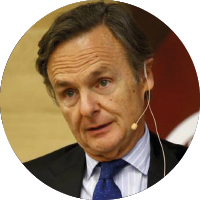|
19:00h - lecture |
classroom3, Alumni Building |
The high schoolbusiness and Humanism is pleased to invite you to the workshop"Neo-illiberalism, Populism and Democracy" with our special guest from Harvard University, Aviezer Tucker.
Presentation
D. Ricardo Martí-Fluxá (President, high schoolbusiness y Humanismo)
Conference
Aviezer Tucker (Harvard University, Davis Center for Russian&Eurasian Studies)
moderator
Jaume Aurell (Full Professor of Medieval History, University of Navarra)
The attack on the Twin Towers in 2001 was a shock of gigantic proportions, since a world that had seemed very safe after the end of the Cold War was now faced with a destabilising element - Islamic terrorism - that shattered all naive hegemonist approaches, such as Francis Fukuyama's The End of History and the Last Man (1992). Over the past decade, however, a second shadow has been cast across the world, but especially in the West: the unstoppable rise of populism, whose ideological foundation is a revision of democracy, not its radical questioning. In a word, modern democracy has revolted against the ideology that engendered it: liberalism.
Aviezer Tucker has reflected deeply on this great paradox. According to the renowned Harvard School of Government professor, it should surprise no one that democracies can become dangerously illiberal. Indeed, this was one of the classic criticisms of ancient democracies. Is the contemporary reaction against liberal democracy simply the same old story, or are we witnessing something unprecedented? The parallels between this current statusand that of the radicalisms of the interwar period, which led to the terrible Second World War, are more than obvious, and invite us to reflect seriously on the repercussions of an illiberal and populist drift of democracy, with all the paradoxes associated with it.
In this lecture-colloquium, Aviezer Tucker sets out to argue that the contemporary revival of authoritarian populism skilfully combines some very socially established traditions with new technologies to produce a highly unstable and contagious new synthesis that threatens basic liberal norms, from freedom of the press to independent judiciaries. His reflections can help us examine how the economic crisis blocked the social mobilityand thus awakened the dark and dormant political passions exploited by the new political demagogues. This slide towards "neo-liberal democracy" can be countered if we restore a "liberalism without nostalgia", instituting policies that can quench populist passions and strengthen liberal institutional barriers against them.

Aviezer Tucker has a rich triple dimension: classicist as training, philosopher of science as an academic and political thinker as an essayist. This endows him with a depth of argumentation that makes him particularly well suited to the subjectinterdisciplinary approach promoted by high schoolbusiness and Humanism. He is researcherof the Davis Center for Russian and Eurasian Studies, Harvard University, and has taught at Harvard's School of Government. His publications include an influential essayon Philosophyof science, focusing on historical discipline(Our Knowledge of the Past: A Philosophy of Historiography, Cambridge University Press, 2004), an analysis of the legacy of totalitarianism(The Legacies of Totalitarianism, Cambridge University Press, 2015) and a profound reflection on the populist and illiberal drift of liberal democracies(Democracy Against Liberalism: Its Rise and Fall, Polity Press, 2020), whose content is the basis of the lecturewe are now organising.





